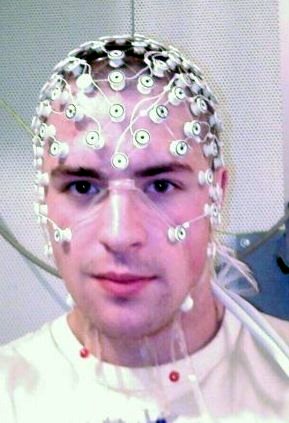

 字體:小 中 大
字體:小 中 大 |
|
|
|
| 2021/10/12 15:29:24瀏覽203|回應0|推薦0 | |
以色列醫生觀察大腦"發現癲癇病患會看到上帝並與之對話 Israeli doctors watch epileptic’s brain while he ‘sees God’ https://bityl.co/94e7 在以色列哈達薩大學醫院治療期間,病人有了自發的宗教體驗,聲稱與上帝對話 RAOUL WOOTLIFF報導 2021年10月11日在耶路撒冷國際會議中心舉行的耶路撒冷主席會議上,來自世界各地的福音派基督徒在唱歌和背誦祈禱文。(Flash90) 以色列科學家可能已經發現了癲癇和通常被描述為 "看到上帝 "的異象宗教經歷之間的聯繫,因為他們在一名病人接受測試以幫助治療這種神經系統疾病時,通過大腦監測設備捕捉到了一個啟示的時刻。 位於耶路撒冷斯考普山的哈達薩大學醫院的研究人員說,在治療一名46歲男子的顳葉癲癇時,該病人有了自發的宗教體驗,他聲稱看到了上帝並與之交談。 患者與腦電圖相連,測量他的大腦活動--直到他摘下電線,開始在病房裡走來走去,宣佈 "上帝派我來找你"--研究人員對這種發作期間的大腦工作情況有了獨特的前所未有的瞭解。 醫生Shahar Arzy和Roey Schurr在上周發表於神經學雜誌《癲癇與行為》的案例研究中描述了這一事件。 沙哈爾-阿爾茲博士(禮節性)。 "當病人躺在床上時,突然愣了一下,盯著天花板看了幾分鐘,後來說他覺得上帝正在向他走來。然後他開始小聲地誦讀祈禱文,尋找他的基帕並把它戴在頭上,更過分地誦讀祈禱文。 "然後,他突然大喊:你是阿多奈(希伯來語上帝的名字)上主!Then, abruptly, he yelled, ‘And you are Adonai (name of the Hebrew God) the Lord!’,,後來說上帝向他顯靈,命令他為以色列人民帶來救贖,"阿爾茲和舒爾寫道,他們說病人是猶太人,但不是宗教人士。 一個腦電圖(EEG)記錄裝置。(Wikimedia Public Domain)腦電圖記錄裝置(維琪媒體公共領域)。 "然後病人站起來,把腦電圖電極從他的皮膚上拆下來,並在科室裡轉悠,試圖說服人們跟隨他,說上帝派我來找你。當進一步詢問時,他說他沒有具體的計畫,但他確信上帝會指示他和他的追隨者在救贖的路上應該怎麼做,"他們寫道。 哈佛大學神經科學家史蒂文-沙克特(Steven Schachter)2009年的一項研究表明,幻覺般的宗教經歷和瞬間的意識缺失可能指向格西溫德綜合症的診斷,這種行為現象在一些癲癇患者身上很明顯。但以色列的研究標誌著這一時刻首次被大腦監測設備捕捉到,並可能被證明是朝著更深入瞭解與癲癇的聯繫邁出的重要一步。 Doctors Shahar Arzy and Roey Schurr(阿爾茲和舒爾博士)的結論是,該男子患有 "發作後精神病(PIP)背景下的宏大的宗教啟示妄想和傳教熱情"。PIP是一種 "癲癇發作後可能出現的精神病發作",根據線上神經學雜誌《發現》雜誌。 《發現》雜誌補充說,看到上帝的經歷 "讓人想起許多宗教人物,從摩西到耶穌到聖保羅到穆罕默德"。然而,它說,"這並不意味著這些領導人都有癲癇病,但有趣的是,這種現象學可以在這種疾病中出現"。 ============================
Israeli doctors watch epileptic’s brain while he ‘sees God’ During treatment at Hadassah Hospital, patient has a spontaneous religious experience, claims to converse with the Lord By RAOUL WOOTLIFF 16 May 2016, 9:16 pm Evangelical Christians from around the world sing and recite prayers at the Jerusalem Chairmans Conference at the International Convention Center in Jerusalem, September 22, 2013. (Flash90) Evangelical Christians from around the world sing and recite prayers at the Jerusalem Chairmans Conference at the International Convention Center in Jerusalem, September 22, 2013. (Flash90) Israeli scientists may have discovered a link between epilepsy and visionary religious experiences often described as “seeing God,” after catching a moment of revelation on brain-monitoring equipment while a patient was undergoing tests to help treat the neurological disease. Researchers at Hadassah University Hospital on Jerusalem’s Mount Scopus said that while treating a 46-year-old man for temporal lobe epilepsy, the patient had a spontaneous religious experience in which he claimed to see and converse with God. With the patient connected to an electroencephalogram (EEG), which measured his brain activity — until he took off the wires and began marching around the hospital room announcing “God has sent me to you” — the researchers had a unique and unprecedented look into the workings of the brain during such episodes. Doctors Shahar Arzy and Roey Schurr described the incident in a case study published last week in the neurological journal Epilepsy and Behavior. Dr. Shahar Arzy (Courtesy) “While lying in bed, the patient abruptly ‘froze’ and stared at the ceiling for several minutes, stating later that he felt that God was approaching him. He then started chanting prayers quietly, looked for his kippa and put it on his head, chanting the prayers more excessively. “Then, abruptly, he yelled, ‘And you are Adonai (name of the Hebrew God) the Lord!’, stating later that God had revealed himself to him, ordering him to bring redemption to the people of Israel,” wrote Arzy and Schurr, who said that the patient was Jewish, but not religious. An Electroencephalography (EEG recording) setup. (Wikimedia Public Domain) An EEG recording setup (Wikimedia Public Domain) “The patient then stood up, detached the EEG electrodes from his skin, and went around the department trying to convince people to follow him, stating that ‘God has sent me to you.’ When further questioned, he said that he does not have a concrete plan, but he is sure that God is going to instruct him what he and his followers should do on their way to redemption,” they wrote. A 2009 study by Harvard neuroscientist Steven Schachter suggested that visionary religious experiences and momentary lapses of consciousness may point toward a diagnosis of Geschwind syndrome, a behavioral phenomenon evident in some people with epilepsy. But the Israeli study marks the first time time the moment has been captured on brain-monitoring equipment and may prove a vital step towards deeper understanding of the link to epilepsy. Arzy and Schurr concluded that the man suffered from “grandiose religious delusion of revelation and missionary zeal in the context of post-ictal psychosis (PIP).” PIP is a form of “psychotic episode that can occur after epileptic seizures,” according to Discovery Magazine, an online neurological journal. Discovery Magazine added that the experience of seeing God is “reminiscent of that of many religious figures, from Moses to Jesus to Mohammed.” It said, however, that “this doesn’t mean that any of those leaders had epilepsy, but it is interesting that this phenomenology can occur in this disease.” |
|
| ( 不分類|不分類 ) |









